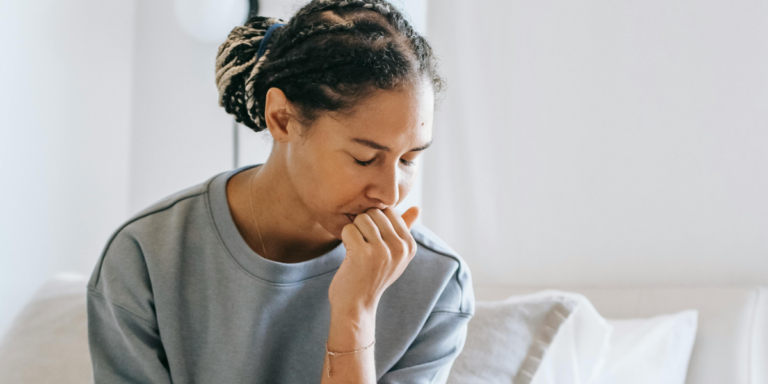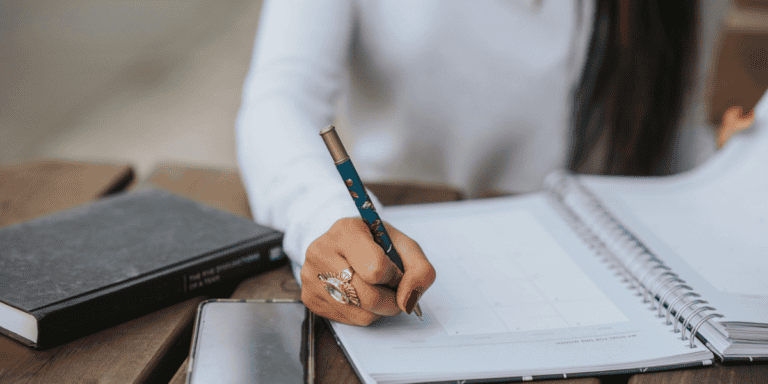Before I jump right into this post, I wanted to ask you a few questions about yourself:
- Do you find that there is always something new that you need to heal from?
- Are you stuck in the past and not ready to move forward?
- Do you feel like you can’t date until you are fully healed?
- Have you created a protective healing cocoon because you are scared to take a step out into the real world?
- Do you want things to change but still end up returning to the self-help books?
There’s nothing wrong with answering yes to any of those questions. I’ve answered yes to many of them in the past.
So what is self-help?
The Merriam-Webster dictionary definition of self-help is “the action or process of bettering oneself or overcoming one’s problems without the aid of others especially: the coping with one’s personal or emotional problems without professional help”
Based on this definition, I take self-help to mean not seeking professional help (e.g. therapist and/or life coach, personal trainer, dietitian, etc…) to tackle problems in life. Typically people will use books, online courses, podcasts and youtube to help them learn and grow.
Self-help resources have been around since the dawn of time. Humans are constantly evolving and learning new skills to make their lives easier and more fulfilling. From philosophers such as Plato and Kant, to religions such as Christianity and Buddhism, there is a wealth of resources guiding people to be better versions of themselves.
The modern day self-help industry is a multi-billion dollar/pound industry. Nowadays, we have multiple gurus and experts paving the way to self-help – you can’t escape it, podcasts, youtube, magazines, newsletters, and blogs. Each person promises that they have found the secret to helping you live your best life.
Check out my 9 favourite self-improvement quotes.
(This blog post = pot meet kettle)
But I digress.
There are a few key areas of life that self-help tends to be focused on:
- Relationships: dating, breakups, marriage, friendships, family
- Finance: saving, reducing debt, financial independence, investing
- Physical Health: weight loss, muscle gain, reducing chronic pain, flexibility
- Mental Health and Wellbeing: reducing anxiety, mind-body connection, changing mindset
- Productivity: habits, goal-setting, organisation, time management, planning
- Education: applying for university, learning new hobbies, study skills, Continuing Professional Development (CPD)
- Career: changing career, getting a promotion, securing a new job
Why should you use self-help resources?
I truly believe that we all should go on some form of healing journey in our adult life where we focus on developing certain aspects of ourselves.
Individuation is such an important stage in life where we figure out what is us and what is not us. What unhealthy thinking habits and behaviours did we learn from our parents/environment and what healthy habits did we learn? What habits can stay and what habits need some improvement? These are the questions that we all need to ask ourselves in life so that we can feel more secure in ourselves. The right self-help resource can help you unpick those questions.
I’m not denying that self-help resources can have an incredible effect on people’s lives when used correctly. If you’re reading self-help books, taking time to digest the material and then implementing the beneficial changes in your life then this blog post isn’t for you.
However, if you have piles of self-help books sitting on your desk, subscriptions to multiple different courses and still haven’t made any changes then keep on reading!
Can self-improvement become an addiction?
According to the Merriam-Webster dictionary and addiction is ‘a compulsive, chronic, physiological or psychological need for a habit-forming substance, behaviour, or activity having harmful physical, psychological, or social effects and typically causing well-defined symptoms (such as anxiety, irritability, tremors, or nausea) upon withdrawal or abstinence: the state of being addicted’
So, by that definition, self-help can become an addiction when it interferes with your daily life and causes some form of distress.
I should know, I spent many years in my early 20s reading self-help book after self-help book without actually taking big steps to incorporate it into my lived experience.
I sure as hell merged a lot of it into my anxious mind so I *knew* what the right thing to do was but I couldn’t be the person who did the right thing.
So I would read more books, convinced that eventually, I would change.
I didn’t.
In fact, I got more depressed and anxious because I started to beat myself up for not changing. Lying in bed, and thinking about all the other more productive things I could be doing was my favourite type of torture.
It was a negative cycle.

In fact, it is something that I still have to keep an eye on. As much as it pains me to say it, I have a recent example:
Last year, I went down the attachment style rabbit hole in an attempt to fix a relationship that wasn’t working. I was absolutely convinced that if I read enough books and signed up to enough courses I would be able to save the relationship despite the very obvious incompatibilities. I diagnosed myself as a Fearful Avoidant and spent months trying to fix myself convinced that I was broken.
I admit that the information I learnt about boundary setting, non-violent communication and needs identification was life-changing.
For a long while, I was stuck in an addictive loop of watching YouTube videos and reading blog articles hoping that they would somehow have the magic formula to fix my life. I wanted to be rescued and spoon-fed the answer.
However, it took me months before I started implementing the information I learnt. I spent years being a people pleaser so it was hard to believe that I was good enough to stand up for myself and I found many excuses.
Eventually, I realised I didn’t need permission to say no to poor behaviour. I decided to change and move forward as the person I wanted needed to be.
Why do people get stuck in a self-help cycle?
Social media has presented a certain image of a healing journey

When I started my healing journey, I had a certain idea of how that would look. I thought I would go down the carefree black girl path with the glowing cocoa butter skin, the big afro, waist beads and the calm soothing voice. I was convinced I would be That Girl.
Maybe your idea of the healing journey is the slim Insta girls who drink green smoothies and get up at 4:30 am. Or the yoga guru, the buff fitness guy or 3rd eye enlightened person.
Whoever it is, I’m sorry to break it to you but your healing journey isn’t going to look like that.
I’m sorry.
Your healing journey will look like you.
Trying to get to the cookie-cutter social media image of a ‘healed’ person is going to keep you stuck because it is not realistic.
Seeking to be perfect without realising that life is supposed to be lived. You can still enjoy life during your journey
A lot of us grow up believing that there was a magical blueprint to life. If we follow the right path and tick all of the self-development boxes we will be able to live the perfect life.
Perfectionism is a curse and perfection doesn’t exist.
However, it is easier to believe that there is a perfect version of yourself that you can eventually become if you just read another self-help book. You might even convince yourself that when you become your idealised version of yourself you will then be able to enjoy life. It will become a self-fulfilling prophecy because there will always be something new for you to learn and/or be better at.
In my experience, this comes down to having an ‘I am not good enough’ or ‘I am defective’ core wound. Without tackling the root of the problem you will be stuck in a lack mentality.
You are using it for motivation
You might be addicted to the short burst of energy that you get from reading or listening to a motivational self-help resource. You find it hard to consistently implement the information you have learnt because you believe motivation is the key to making changes.
It is not.
What you need is discipline not motivation.
You are using self-help resources as a form of distraction and avoidance
Where other people scroll through social media to avoid themselves, you hide behind the illusion of productivity. It’s easier to bury your head in a self-help book when you have very real things you need to deal with in your life.
I started my self-help journey while I was in my second year of university. I had heaps of deadlines and extracurricular activities going on at the time and instead of tackling the overwhelming amount of activities I needed to complete, I bought another self-help book.
I guess I hoped that all my problems would melt away when I found the hidden secret in the books. Obviously, my avoidance just made things much more overwhelming and debilitating.
You have a fear of the unknown
It is understandable, life is scary and unpredictable. Self-help books/courses can be incredibly useful resources to guide you in an area of life that you have no experience in. The problem is that you refuse to learn how to deal with the discomfort of uncertainty and it stops you from experiencing something new. You could be missing out on amazing experiences because you are scared to take a leap into the unknown.
What are the signs of a self-help addiction?
- You go well over budget on self-help books/courses
- You spend hours watching youtube/tik tok in hopes of finding the perfect explanation
- Your friends and family are frustrated with you because you only talk about self-help
- You feel anxious if you are not immersed in a new resource
- Your work life is being negatively affected
- You start to feel like you are not good enough
- You use self-help as a crutch for your life
- You ignore professional medical advice in favour of self-help books
How to break out of the self-help cycle?

Remind yourself why you started and look at how far you have come
Even though it might not feel like it, you would have learnt so much about yourself and others from consuming those self-help resources. Reflect on your original reasons for starting your healing journey and identify the things that you subconsciously or consciously do differently now.
Be proud that you have taken the initiative to change something that you didn’t like about yourself and now you are one step higher up on the competence learning scale.
You may have started your journey at the first stage which is unconscious incompetence. For example, you didn’t know that you had poor communication skills and never considered there to be a problem.
However, after reading a self-help book you were able to acknowledge your problem with communication thereby moving you to the conscious incompetence stage.
In this example, you would move to the conscious competence stage when you use communication scripts to navigate difficult conversations and practice implementing the information that you have learnt.
With enough practice, you will move into the final stage which is unconscious competence. This is when you can automatically display good communication practices and no longer need to prepare scripts.
Keeping the competence learning scale in mind, reflect on where you are in your journey. Even making it to the conscious incompetence stage is a big deal and you should celebrate that win.

Accept that healing is lifelong, there isn’t an end to this journey.
At some point, you’re going to have to look at yourself in the mirror and accept who you are. You’re going to have to be kind to yourself and accept where you are in your journey. You are not perfect and you never will be AND that’s perfectly okay. That is normal.
You are just participating in the human experience and perfection was never an option.
Take a deep breath…
In and out
I know it’s hard to believe in yourself when you see other people achieving the things you want to achieve or when you know for a fact there are things you are not doing well in life.
But constantly striving after the next big hit of dopamine from a new self-help book, course or Instagram post is not going to get you anywhere if you don’t take the first step to just BE.
Be you.
Be present.
You will change and grow and implement all you have read but sometimes you just have to take a leap and actually live your life.
You are good enough.
Yes, you will make mistakes but you will also learn from them. In life we go through cycles of rupture and repair: physically through strengthening our muscles, socially through navigating conflict in relationships and mentally through experiencing new things and changing our point of view.
Take responsibility for your life, no one is coming to save you. Give life your best shot. Be vulnerable. Apologise when you mess up. Try better next time but most importantly: LIVE YOUR LIFE.
‘Life is for living’ is my motto.
The right time is now.
Take a hiatus from self-help
You could try to give yourself a break from self-help for a set period of time. During my healing journey, I reached the point where I needed to stop consuming other people’s thoughts and ideas about how I should live and I needed to start producing the life I wanted.
Take the information that you have learnt and see how you survive in the real world without using self-help as a crutch. You will slowly start to build trust in yourself when you realise that you have survived without running into a self-help book.
Pick a goal, any goal and make it SMART.
Identify the area in your life that is keeping you stuck in the self-help addiction and pick a goal. Make sure your goal is Specific, Measurable, Achievable, Relevant (or Realistic) and Time-bound. Having a SMART goal will help you to start implementing the changes that you want to see in your life. Maybe even consider getting an accountability partner to keep you on track.
Seek professional help
Most importantly, if your self-help addiction is affecting your daily life in a negative way and/or you are struggling with unhelpful core beliefs consider getting professional help. This could be in the form of a therapist or a life coach depending on how debilitating your condition is. You don’t need to suffer in silence or carry the burden alone.
Help is out there.
Constantly seeking self-help can be a symptom of a larger mental/emotional issue so it is important to work with a therapist if you feel that you need help unpacking trauma.
You could also use a life coach to provide you with accountability and help you identify ways you can move forward with the goals you have set.
Both types of professionals will provide you with a listening ear, support and encouragement which is incredibly valuable during your healing journey.
Quote of the week
‘Don’t let perfect be the enemy of good’
Don’t let your healing journey stop you from living your life. Life is for living and you can create a valued life even in the middle of chaos.
If you made it down to the end of this post, why not comment and let me know how you broke out of your self-help addiction?






